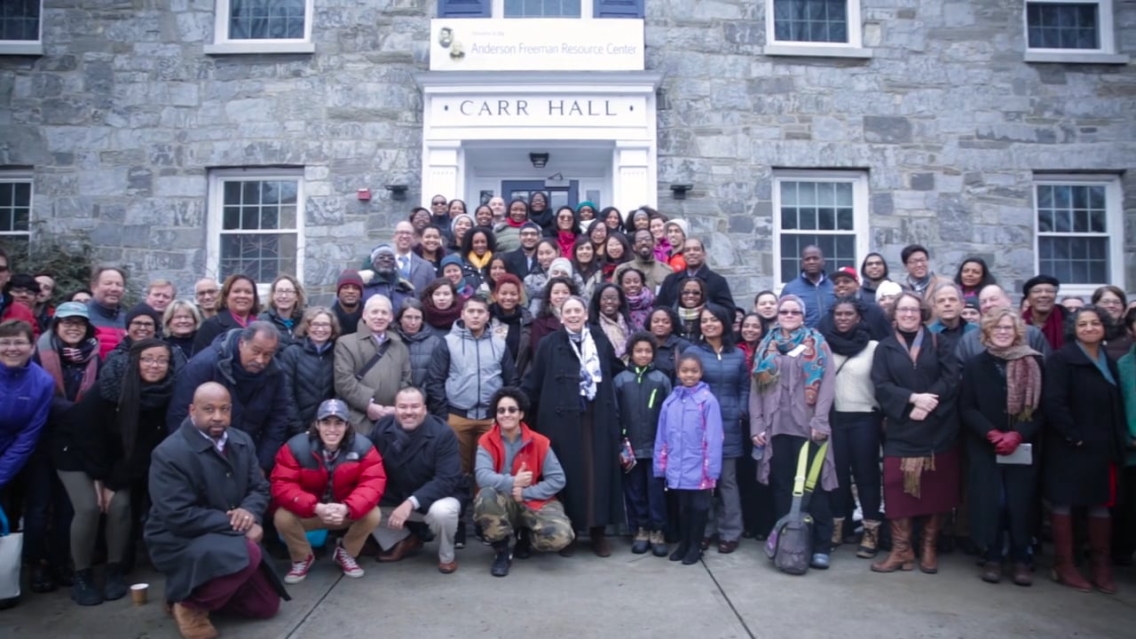New Anderson Freeman Center Offers Support for Underrepresented Students [video]
Slideshow
[view:embed_content==505364]
MIDDLEBURY, Vt. – Before a crowd of more than 300 students, faculty, staff, and alumni at Mead Chapel on Friday, the black feminism and civil rights scholar Kimberlé Crenshaw struck a hopeful note. “It’s a very special occasion for Middlebury,” said Crenshaw, “particularly because it is Alumni of Color Weekend. It’s a wonderful statement to say that alumni of color really do want to come back, so something right is happening here that isn’t happening on a lot of other college campuses nowadays.”
Crenshaw, a professor of law at UCLA and Columbia Law School, was the keynote speaker on a weekend of grand opening events for Middlebury’s Anderson Freeman Resource Center.
In her talk, Crenshaw offered an urgent assessment of race relations in America. She observed that, with the Obama presidency drawing to a close, the societal changes many had hoped for have failed to materialize. “In some ways, racial discourse has reached a new low,” she said, referencing recent comments by presidential candidates and a Supreme Court justice.
A major obstacle to progress for minorities in America, said Crenshaw, is the lack of attention on black women and girls. “Women and girls are not mentioned in the framing of the problem of racial injustice in this country. … and yet black girls are six times more likely to be suspended from school than their white female counterparts in New York City, and 10 times more so in Boston.”
Dramatically illustrating her point, Crenshaw asked the audience to stand and listen to a list of names of Americans she described as victims of “racialized state-sanctioned violence.” She asked audience members to sit down when they heard a name they did not recognize. The audience remained standing through a familiar list of male names–Michael Brown, Trayvon Martin, Eric Garner, Tamir Rice, and Freddy Gray. But as she began the female names–Natasha McKenna, Tenisha Anderson, Michelle Cusseaux, Maya Hall, and Kayla Moore–most of the audience sat down.
“This is the consequence of framing, what it excludes and what it doesn’t give us access to,” said Crenshaw. “All of these women were killed [by police] within a week or 10 days of the men I just mentioned.”
Crenshaw told students at Mead that they would be instrumental in moving things forward. “You are part of the generation that has renewed the idea that it is democratic and it is our responsibility to agitate around a certain set of experiences and resist this haze of post racialism,” Crenshaw said.
On Saturday afternoon, 125 people gathered for a festive, if chilly, ribbon-cutting ceremony to dedicate the Anderson Freeman Resource Center (AFC)–a new facility dedicated to supporting students from historically underrepresented groups. On the steps of Carr Hall, the center’s director, Roberto Lint-Sagarena, said the center was the result of years of hard work by too many people to name, but he particularly thanked students who had worked hard to bring the Center to life.
In her welcoming remarks, President Laurie Patton also noted the important role students played in creating the new center. “As part of Middlebury’s institutional mission, we challenge students to participate fully in a vibrant and diverse academic community,” said Patton. “Yet, as many of you know, the existence of this intercultural center is due in large part to a cohort of students who challenge us, the institution, to live up to its language of welcoming this vibrant and diverse community.
“I would like to take a moment to recognize those students and alums and to thank them for their thoughtfulness, for their sense of purpose and justice, and for their resolve.”
Following the ribbon cutting, Associate Professor of History Bill Hart gave a lecture titled “To ‘engraven her [Middlebury College] an imperishable name…with honor’: Martin Henry Freeman 1849, Mary Annette Anderson 1899, and the Challenges of Early Diversity at Middlebury College.”
For the second year in a row, Middlebury Alumni of Color Weekend took place during Martin Luther King, Jr. Weekend. This year’s gathering drew alumni from six decades to celebrate the opening of AFC, but also to meet with students and administrators to discuss issues related to diversity at Middlebury. On Saturday morning, the group met with President Patton for a conversation about current and future plans, while later that day a panel discussion at Wilson Hall explored the “History of Diversity and Student Activism at Middlebury.”
The community also gathered in Mead Chapel on Martin Luther King Day for an evening of music, oratory, and dance. See the slide show and story here.
With reporting by Stephen Diehl and Robert Keren; photos by Todd Balfour and Yeager Anderson ’13.5.


